And what not to feed your pigs!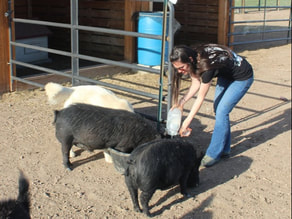
One of the most exciting aspects of raising pigs, in my opinion, would be their ability to turn "trash" into a treasure of bacon! Once I started collecting kitchen scraps for the pigs and goats on our farm I realized how much food goes to waste. Onion skins, egg shells, and potato peels were once sent to the trash, never to reach their full potential. Yes, I realize these items are gold for the compost pile, but I have an ugly confession to make here.
I am a terrible compost keeper! There, I said it! I am determined to master composting but today let's talk about another way to create a (nearly) zero waste kitchen. 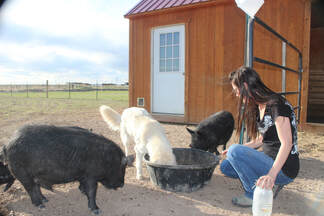
Pigs are wonderful homestead recyclers. They are pretty content eating almost anything which makes them perfect for recycling kitchen scraps. Of course it is important to give them a variety and keep in mind their nutritional needs, mainly lysine. Lysine is important to swine. Without it amino acids cannot combine and form muscle protein (less bacon, no thank you).
Kitchen scraps that are good sources of lysine include peas, any dairy including cheese, and cooked meat and bones (not from pigs). You will find mixed opinions on feeding pigs meat and so I will give you my opinion here and let you decide what works best on your homestead. Pigs are omnivores. In past generations, pigs were not limited to a vegetarian diet. Pioneers depended on their farm animals to make the most of what they had in order to provide for their families. Presently, a pig will not scoff at eating a field mouse or snake that happens to cross their path during feeding time in the pasture. They also enjoy worms and other critters that call the pasture home. I DO NOT feed my pigs pork. This is where the possibility of disease transfer outweighs the desire to be zero waste. I bring meat scraps and bones to our livestock guardian dog that lives in the pasture with the hogs full time. What she doesn't eat the hogs do. 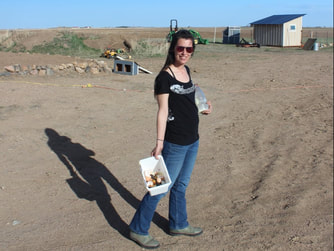
Dairy is possibly the most abundant source of lysine on the homestead when there is a milk cow. Presently, our farm is lacking a milk cow and so we have to either ask our local organic grocer for outdated milk or give up the small amounts of whey thats leftover from draining yogurt or making ricotta cheese. Dairy never goes to waste. Even the funky smelling cottage cheese that got pushed too far back in the fridge is a welcome pig snack. Avoid extremely spoiled dairy, of course.
As lysine insurance, I always keep a few bags of organic field peas in the barn. When the kitchen isn't producing enough lysine rich scraps, I will dish out a few scoops of field peas a day. Planting peas in the pasture is another great way to ensure your hogs will get what they need. Our pasture is in need of some maintenace. Field peas are a wonderful cover crop that add nitrogen to the soil. I love multi-use items on the homestead. 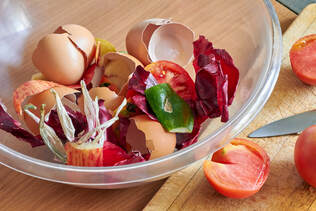
Some things to remember about kitchen scraps- they vary greatly from day to day. I have read lots of books with varying information as far as what NOT to give pigs. I do agree that giving your hogs a basket full of avocadoes each day can give them issues but the occasional avocado in the scrap bucket hasn't been an issue on our farm. Same goes for raw potato peels and raw eggs. My diet is varied and so is theirs.
I do have a list of foods that I never feed our hogs. These include soy, pork, uncooked and dried beans, processed foods with lots of sodium, sugar, and questionable ingredients. Yes, pigs are great recyclers but you are what you eat eats. I have high standards for our food supply and that doesn't end with my animals. With some forethought, kitchen scraps can be wonderfully supportive to your hog's health. Garlic is a powerful natural antibiotic. Adding raw garlic regularly to your pig scraps will help prevent health issues. I take the peels out of my garlic press and throw those in the bucket frequently. Squash and pumpkin seeds have been fed to pigs as a natural dewormer. If you feed grains, it is best to ferment them first for better digestibilty. You can find spent grains from the fermentation process in beer making at a local brewery usually for free. Occasionally I will pour the juice from my fermented veggies in the bucket too. I hope this gives you some ideas on how you can turn your food waste into delicious pork roast and bacon. For this reason alone every homestead needs a pig! Other farm animals can be picky eaters or their nutritional needs can't be met with kitchen scraps. I know my chickens avoid mushrooms at all costs but our hogs love them. Less waste on the farm means less inputs from off the farm. It's a wonderful balance.
0 Comments
Your comment will be posted after it is approved.
Leave a Reply. |
AuthorFrancesca, wife and mother of three, eagerly shares day-to-day life on her ten acre farm in northern Colorado. Categories
All
Archives
March 2023
|
|
Copyright © 2022 3 Seeds Farm
Site powered by Canopy Creative Marketing |
|

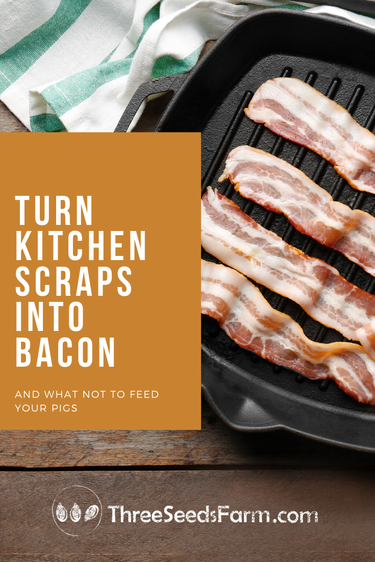

 RSS Feed
RSS Feed
